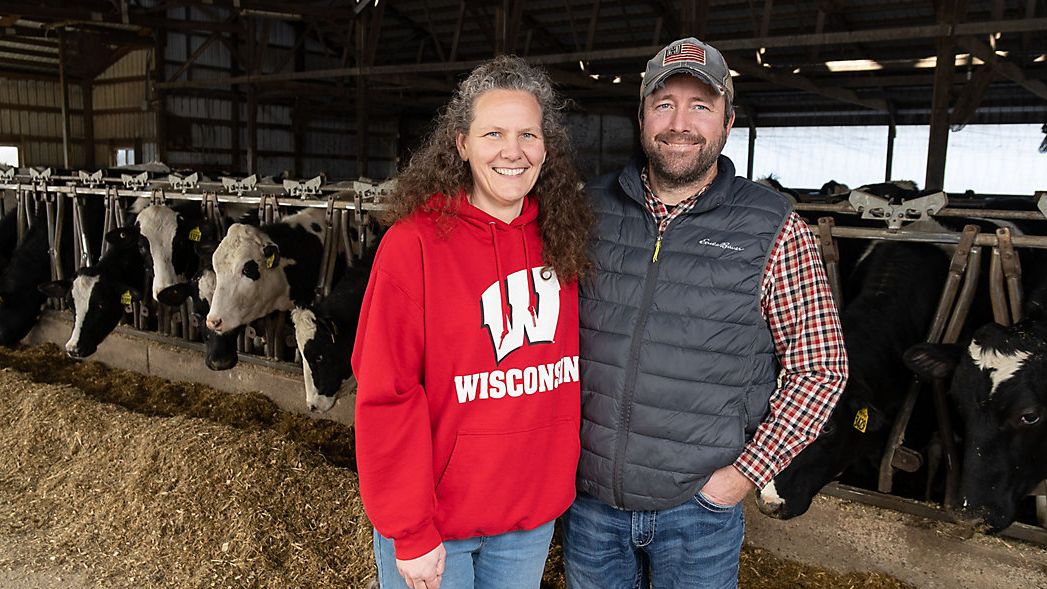MADISON, Wisconsin — By 2023, Sam Zimmermann’s health was deteriorating due to polycystic kidney disease.
Key Points
- In 2023, Sam Zimmermann was experiencing worsening symptoms of polycystic kidney disease.
- Polycystic kidney disease, an inherited condition, leads to the formation of cyst clusters in the kidneys, resulting in their enlargement and loss of function.
- In January 2023, Nicole Knoblock, who lived a mile away from Zimmermann in central Wisconsin, discovered his battle with the disease and decided to explore ways to help him.
- Despite not being a perfect match, Knoblock selflessly donated one of her kidneys through a paired exchange program, bringing Zimmermann closer to finding a suitable donor.
- There is a significant number of individuals nationwide awaiting kidney transplants.
Polycystic kidney disease, characterized by cyst accumulation in the kidneys, had affected Zimmermann’s father and other relatives, necessitating transplants in their later years. However, Zimmermann, in his forties, faced the need for a transplant sooner than expected as his kidney function declined.
“I hadn’t anticipated being this unwell at this stage of my life,” Zimmermann expressed. “While I knew a transplant would be necessary eventually, I hadn’t foreseen needing one so urgently.”
Upon learning about Zimmermann’s condition in January 2023, Nicole Knoblock, his nearby neighbor, felt compelled to take action. Encouraged by her son, she decided to become a living kidney donor through the UW Health Transplant Center and the National Kidney Registry.
“My son urged me, saying, ‘Mom, you have to do what you can to assist someone,’ and I couldn’t ignore that,” Knoblock shared. “It seemed like a slim chance, but I took it.”
Despite not being an exact match, Knoblock’s kidney donation initiated a chain reaction that brought Zimmermann closer to finding a suitable donor.
The National Kidney Registry’s innovative approach broadened the pool of potential recipients, enhancing matching accuracy and reducing rejection risks. Scot Johnson, the living donation manager at the UW Health Transplant Center, emphasized the benefits of such initiatives in expediting the transplant process for individuals like Zimmermann.
Knoblock, a dedicated special education teacher, timed her donation during the summer to ensure recovery before returning to her classroom in the fall. On July 27, 2023, she underwent the donation procedure, marking the 4,000th living donor at the UW Health Transplant Center.
“I wasn’t focused on the milestone; I was simply thrilled to be able to take a walk,” Knoblock remarked. “My main concern was my recovery and when Sam would undergo his surgery.”
Expressing pride in joining the ranks of kidney donors at UW Health, Knoblock highlighted the impact of her contribution on both Zimmermann and the recipient of her kidney.
Shortly after Knoblock’s donation, Zimmermann received news of a matching donor, having relied on dialysis since the spring.
On September 13, 2023, Zimmermann underwent a successful kidney transplant from another living donor.
Dr. David Aufhauser, a transplant surgeon at UW Health, and assistant professor of surgery at UW School of Medicine and Public Health, oversaw Zimmermann’s transplant surgery, which involved removing his diseased kidneys and replacing them with the donated organ.
While Zimmermann faced a longer recovery due to the dual surgery, the procedure promised a significant improvement in his quality of life.
Before the transplant, Zimmermann, a dairy farmer, had to sell his cows as managing them became challenging. However, with his health improving post-transplant, he envisioned rebuilding his farm, inspired by newfound hope.
“I’m beginning to envision a future once more,” Zimmermann shared. “Flipping through a farming magazine, I’m gathering ideas to revive my farm.”
Zimmermann credited Knoblock for enabling his dreams and fostering a stronger bond between them beyond their friendship.
“I consider myself fortunate to have her as a neighbor,” Zimmermann expressed. “Our connection has transformed us into lifelong family members.”
